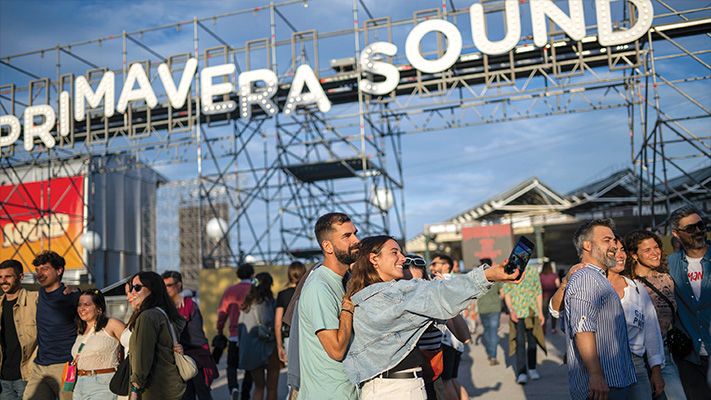
Great live performances reveal things in music that hide within the recorded version: You aren’t washing dishes at a concert. In those reality-stopping moments when the art being created in front of you is compelling enough, you’ll forget you even possess a smartphone. Now that it’s music festival season, as a resident of Brooklyn, the center of the allegedly most culturally gravitational megalopolis in the Western world, I might be expected to have local access to top-notch offerings from the corporate concerns that bring artists together in the summers. Yet where I live, the putative center of the world, the pickings are slim. New York City music fans had the option of spending $359 to attend this past weekend’s Governors Ball Music Festival, where a thin bill of retreads, mediocrities, and TikTok ephemera awaited them.
The top of the bill was decent enough if you were willing to pay exorbitant prices to see short and flat-sounding sets from The Killers and SZA, but the city’s biggest show of the year is nevertheless over by midnight and beer is a $12 luxury. Armies of police and paramedics await the consequences of the next tainted cocaine batch, and the authorities have a justified fear of what might happen when addled young revelers wander into the middle of Queens late at night. Multiday music festivals have become so fundamentally unmanageable in New York that Rolling Loud, the taste-setting hip-hop spectacle, hasn’t mounted an event in the city since 2022, joining The Meadows, Panorama, All Points West, Across the Narrows, NorthSide, and the CMJ Music Marathon in the metropolitan area’s annals of failure.

That’s why I hopped across the Atlantic to Spain, where people have figured out something the culture executives in the supposedly hippest parts of America have forgotten, which is how to compete on quality alone. Primavera Sound, held at the Parc Del Forum in Barcelona each June, has become the best music festival on Earth by delivering the best product it possibly can. At sunset on opening night on May 30, Brooklyn noise rock pioneers Blonde Redhead played to over 5,000 fans in a seafront amphitheater, a bigger crowd than the band would get in its home country under any circumstances. On Saturday, lightning forked over Bikini Kill’s Kathleen Hanna as if the Washington punk prophetess had summoned it herself.
In safetyist America, the show would’ve been called at the first distant rumbling, but here it was only the fans of the emo touchstones American Football who were sheltering in place, deep in some memory of their 14-year-old selves and happily soaked. The music went on till 6 a.m. every day. All weekend, sturdy young men wandered the festival with kegs strapped to their backs, offering $6 pints of Estrella. More than one woman noted to me that the portable bathrooms, cleaner and more plentiful than their American counterparts, never ran out of toilet paper.
What’s going on here? Perhaps NATO is to blame — maybe American festivals are an extortionate, cacophonous, and quasi-militarized slog, while Europe’s are brilliantly curated and humanely run, because the United States shoulders so much of the continent’s defense burden. I am only half-joking: The music-industrial complex that allows an event like Primavera to take place operates out of the U.S. and is sustained through American capital and consumer spending. It is the European obsession with our own cultural products that makes the party possible: Two of the three headliners in Barcelona were American, and a field full of Brits and Spaniards sang along to Lana Del Rey and SZA on Friday and Saturday night.
At Primavera, an American music fan could take stock of his or her country’s current manias and accomplishments. Our culture continues to dominate the developed world, even if we’ve ruined many of our own native vectors for consuming it properly, in light of the slow death of our movie theaters, record stores, and music festivals. At Primavera, our victory could sometimes look like a kind of global contagion. Ethel Cain is a transgender artist raised by homeschooling Florida evangelicals who sings giant slowed-down country-drone weepers about the girlhood that biology, society, and her own theocratic family robbed her of. The music is almost showily intense, and in Barcelona, many of the fans in the front had tears streaming down their cheeks. Cain’s new and as-yet-unreleased numbers showed that her art has finally sunk into swampy atonality. As personal fashion statements went, an extremely neat Blair Witch tattoo competed with a black pro-Palestinian shirt in Arabic-style English font, a garment that had an odd resemblance to the Islamic State flag.
American art is thoroughly identitarian now, and Cain represents its more strident pole, the end of the spectrum that demands a menu of specific emotional and political responses regardless of the product’s artistic value. If those responses aren’t yours, you will find little reason to care. On the other end of that spectrum is the New York rapper Billy Woods, who commands attention by proudly proclaiming how uninterested he is in what you think. “I don’t wanna see Nas with an orchestra at Carnegie Hall,” he raps. “No man of the people — I wouldn’t be caught dead with none of y’all.”
With respect to Taylor Swift, Woods is the real last great American dynasty. The run of brilliance that began with 2019’s Hiding Places, or maybe even 2012’s History Will Absolve Me, is unmatched by any other comparably ambitious American musician of the era. In Barcelona, he performed at night under a neobrutalist monumental solar array, the Parc Del Forum’s unreal architectural centerpiece. He came onstage in a plain black shirt and jeans as a cool breeze whipped off the nearby Mediterranean. “Can I get the lights down as low as legally possible?” Woods asked the booth. With the artist himself obscured, the set became a brain-splitting catalog of nightmare in verse: Woods rapped about watching anthropologists “watching negros sell dope;” he’s “chasing dragons on aluminum sheets” and then “watching my body survive myself.” In one song, he raises the possibility that Boko Haram might have a point in asserting that Western education is evil. Rather than horror, my reaction was: Do they, actually? “Everything I learned in community college was a lie…couldn’t read a book if I tried,” growled the trickster baritone of a rapper who drops more references to high culture, to Henri Matisse and William Burroughs and Cormac McCarthy, than any of his peers.
I had always thought of Woods as a nervy doom poet with an uncanny gift for transcribing the most disquieting regions of his subconscious into verse. In Barcelona, I realized how deliberate his music really is. Like Cain, he has an unusual family history that makes it into his work — Woods’s father was a black radical who moved his family to Zimbabwe and served in Robert Mugabe’s government in the ’80s. In his most famous song, “Spongebob,” which he played in Barcelona, Woods appears to rap from al Qaeda’s perspective as American bombs fall on Tora Bora. Later in the set, he’s ignoring a Playboi Carti performance somewhere in Europe, “smoking alone, thinking of home.”
CLICK HERE TO READ MORE FROM THE WASHINGTON EXAMINER
Maps, Woods’s highly lauded album from last year, takes up one of our great national themes, that of heading to Europe to understand what’s going on within our own society and within ourselves better. His music is propelled by a careful interplay of militancy and ambivalence — experience and memory amplify and complicate his more extreme ideas, a typically American unity in self-division that’s often achieved in the space of a single verse. In constantly shifting both toward and away from himself, Woods shows the best of what’s possible within our culture’s sharp identitarian turn.
At a festival as impossibly good as Primavera, you could get discouraged at seeing what we can’t have stateside. But you can still head back across the Atlantic confident in the knowledge that American genius isn’t dead yet.
Armin Rosen is a New York-based reporter at large for Tablet.






